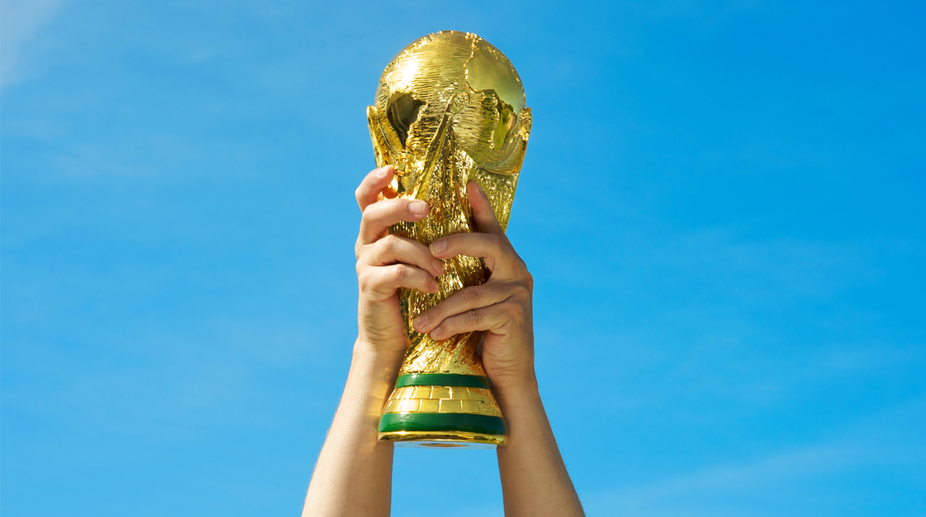England manager Gareth Southgate to feature in Bear Grylls’ ‘Mission Bear’
Southgate is currently in charge of the England team which is participating in the Euro 2020 qualifiers.

fifa-world-cup Representational Image (Photo: Getty Images)
Russia has said gay and lesbian fans should feel welcome at its World Cup this month but violent threats against LGBT people planning to travel to the event tell a different story.
Other LGBT football fans who have attended international tournaments say they have no intention of visiting a country notorious for anti-gay laws and in one region the torture of gay men by police.
Advertisement
Di Cunningham, who heads an alliance of LGBT fan groups in the UK, was sent anonymous emails warning the organisation to stay away from the World Cup after she gave an interview to Russian media about her plans to come.
Advertisement
One email, seen by AFP, contains a photo of a man’s hand holding a switchblade with a warning that the sender would be waiting to knife the visitors in Russia.
Another, purporting to be from a lawyer, said the “sodomite” organisation was being investigated and recommended members keep away from the country.
The threats have not put off Cunningham or Joe Wright — a law student who runs campaigns for the alliance — from travelling to the tournament.
“I want to support my team and to ensure that, however small, there is a visible LGBT+ fan presence in a country which is hostile to that community,” Cunningham said.
She added it was “unacceptable” FIFA had given two tournaments in a row to countries, Russia and Qatar, that do not respect LGBT rights.
Wright said his friends and family would prefer he stayed at home as they were worried about his safety in Russia both as a gay person and an England fan, in the current diplomatic fallout between Moscow and London.
But “I want to experience the atmosphere, the thrill of going to a World Cup and, of course, I want to cheer on England,” the 25-year-old said.
Pride in Football reported the anonymous threats to FIFA and were told they are being investigated by Russian organisers.
– ‘A warm welcome’ –
While larger Russian cities do have LGBT scenes and communities, violence against gays and homophobic rhetoric in the country regularly make global headlines.
A 2013 “gay propaganda” law officially forbids the promotion of “non-traditional sexual relationships” to minors and effectively bans gay rights activism.
Campaigners have been charged for sharing information about LGBT rights on social media and detained for carrying rainbow flags at demonstrations.
And last year gay men in Chechnya, a majority Muslim republic in southern Russia ruled by strongman Ramzan Kadyrov, said they had been tortured by law enforcement agencies.
Despite this, Alexei Smertin — a former football player and the tournament’s anti-discrimination chief — has said gay fans should feel “safe and comfortable” at the event in Russia.
“All visitors to Russia in 2018 — regardless of race, gender, religion, ability or sexual orientation — can expect a warm welcome, great hospitality and an unforgettable experience,” FIFA’s Local Organising Committee told AFP.
It added that authorities will allow the display of rainbow flags in stadiums and public celebrations. Alexander Agapov, the head of the Russian LGBT Sport Federation, welcomed these statements but said he doubted any increased tolerance would endure beyond the four weeks of the World Cup.
The 35-year-old said the focus on visiting LGBT fans could play into official propaganda that presents homosexuality as a largely Western rather than Russian phenomenon.
“The question of human rights and diversity in sport gets mixed up with being a good host — it allows officials to say yes, we’ll make an exception, we’ll guarantee safety, everything will be fine for your gays and your lesbians,” he said.
“The tournament will pass but the (gay propaganda) law will remain.” – Diversity house –
The Russian LGBT Sport Federation is working with the international anti-discrimination network FARE on “Diversity Houses” to open in central Moscow and Saint Petersburg during the tournament.
The houses will host exhibitions and provide spaces for LGBT and ethnic minority fans to come together and watch matches.
FARE’s director Piara Powar told AFP his organisation had sought reassurances from authorities the locations would be properly protected.
FARE has also put out a guide for LGBT travellers planning to come to Russia during the World Cup — advising them, for example, to exercise caution when using dating apps, which have been used by homophobic groups looking to target gay people.
But safe spaces and reassuring noises from organisers have not been enough to convince some gay fans to visit.
“Football should be a sport, not a war,” sports project manager Klaus Heusslein said in a telephone interview from Berlin.
The 57-year-old, who has been to the last two European Championships, said he did not know any LGBT people who would travel to Russia.
“It might be more enjoyable to watch it in front of a TV in a safe country rather than being there, even though I would love to go to such places,” he said.
Advertisement